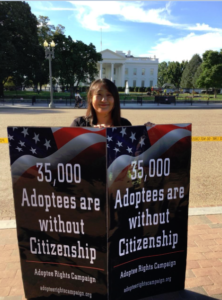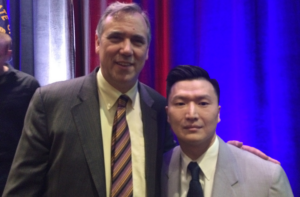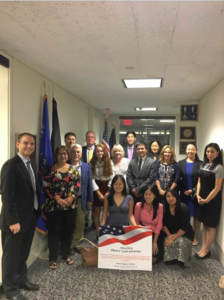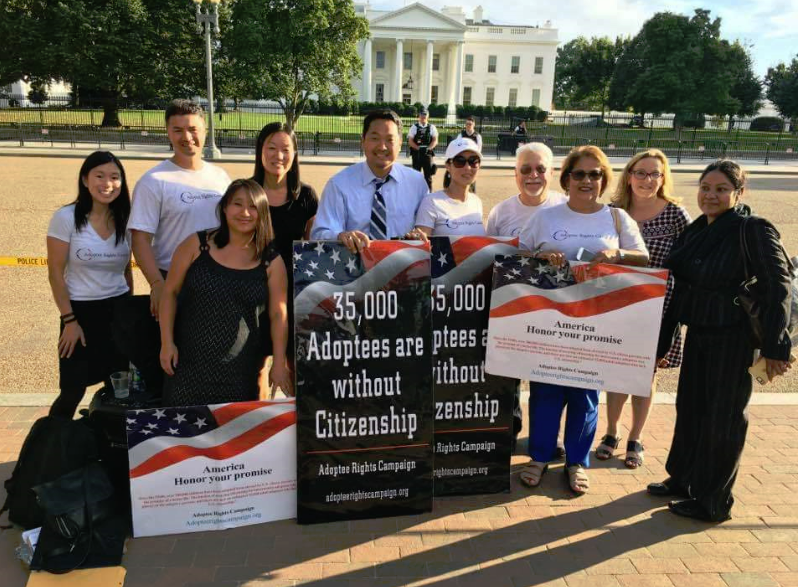By Olivia Wang
AsAmNews Staff Writer
Adoptees are making a big push in the nation’s capitol this week to win a path to citizenship .
The bill, which failed to pass last year after President Donald Trump assumed office, would allow international adoptees who were born before February 28, 1983 to become U.S. citizens.
“We estimate that there are about 35,000 international adoptees living in the United States without citizenship. Twenty thousand of these come from South Korea,” said Becky Belcore, a Korean adoptee and one of the co-founders of the Adoptee Rights Campaign told AsAmNews.
While the majority of affected adoptees were born in South Korea, adoptees from 22 other countries have sought help from the organization. 
In 2001, the Child Citizenship Act granted U.S. citizenship to all future international adoptees and those under the age of 18 at the time of the bill’s enactment. However, this left thousands of adult adoptees unprotected and vulnerable to deportation.
Many of these children have been living in the United States since infancy or early childhood and have been unaware that they were living in the country as illegal immigrants.
According to the Adoptee Rights Campaign, there are three main reasons why older generations of adoptees never received citizenship.
The first reason is that many adoptive parents were unaware that they were required to apply for their child’s citizenship. In other cases, parents were aware, but failed to complete the process, which is time consuming and expensive. In a few situations, adoptive parents were abusive to their child.
Adam Crapser, is one adoptee who suffered abuse and failed to receive U.S. citizenship. He was adopted from South Korea when he was 3-years-old by an American family that eventually put him in foster care. Last year, Crapser was deported to South Korea at the age of 41.

Although Crapser suffered abuse in the homes of his first and second adoptive American families, he had no desire to return to a country where he was a stranger to both the language and the culture.
“As a child, I didn’t ask to be sent to the United States. I didn’t ask to learn the English language. I didn’t ask to be a culturalized American,” Crapser told The New York Times. “They waited until I had a family, and they waited until I had children. They waited until I had something to lose.”
Crapser is amongst an estimated 30 to 40 Korean adoptees who have been deported from the United States.
It was Crapser’s story that caught the attention of politicians in D.C. last year. In November 2015 Senator Amy Klobuchar (D-MN) sponsored the Adoption Citizenship Act in the senate. Seven months later, Representative Adam Smith (D-WA) introduced it to the House.
However, once the Trump administration came into power, politicians were hesitant to work with anything that would amend the Immigration and Nationality Act. The Adoption Citizenship Act subsequently died in Congress.
Now, after the recent suicide of Korean adoptee Phillip Clay, who was deported a few years ago, advocates are hoping that Congress is ready to pass the bill. 
In the past two days, representatives of the Adoptee Rights Campaign have held 22 meetings in D.C. One of their most important goals at the moment is to find a Republican sponsor, since bipartisan support is essential to the Act’s success.
“So far we’ve been received positively by Judiciary Committee members,” Belcore said. “Most agree that it’s not right that adoptees brought to the United States legally by American families can’t be citizens.”
“Our goal now is to raise public awareness about this issue. People are often shocked that international adoptees are being deported. For now, we will continue to organize in local communities.”
More information and a petition to lawmakers can be found on the Adoptee Rights Campaign webpage.
AsAmNews has Asian America in its heart. We’re an all-volunteer effort of dedicated staff and interns. You can show your support by liking our Facebook page at www.facebook.com/asamnews, following us on Twitter, sharing our stories, interning or joining our staff.

